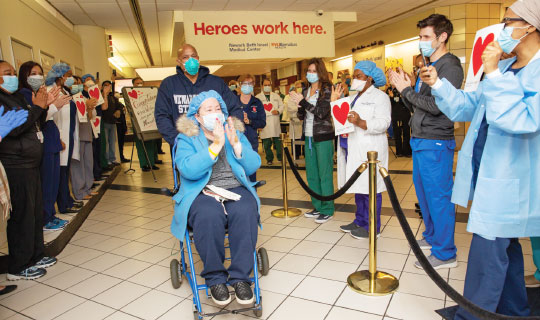“I will never forget the way those people made me feel. I was scared, but I felt that I was going to be safe and they weren’t going to let anything happen to me.”

A seasoned nurse and educator gained new insights from her experience as a seriously ill COVID-19 patient.
By late February, we at Newark Beth Israel Medical Center had already started discussing the imminent threat of COVID-19. Being in such close proximity to New York and Newark Airport, we knew we had to be able to recognize the signs of COVID-19 and care for those patients.
We started preparing nurses, who had long since assumed administrative roles, for frontline work—reviewing the basic functionality of clinical duties such as how to take vital signs, manage IVs and the like. If we had a surge of patients, we wanted to be ready.
And we did see that surge. In the beginning, we were seeing very sick people, testing was limited and most people did not recognize the symptoms of the illness, so they came to us when they were really quite ill.
A complex virus
I came home from work on a Friday and when I got out of the car, I realized I had a fever. I stayed home for a week trying to treat myself with Tylenol, hot lemon water and vitamin supplements. We nurses are notorious for being bad patients.
What makes this virus so complex is that it hits people in so many different ways. I’ve seen it in my own family: My 92-year-old dad tested positive, but has had no symptoms at all. My two sisters tested positive and one had cough and a low-grade fever; the other had cough, wheezing and a high fever, but they both managed their symptoms at home.
I never had a cough, but the tipping point for me came when I was terribly weak and debilitated with vomiting, diarrhea and constant fever. When I finally went to Newark Beth Israel, my oxygen was very low and my lungs were inflamed. They admitted me, and I stayed in the hospital for six days; I was on oxygen the whole time.
Grace under pressure
At that point, in the northern New Jersey area, the news was constantly about the number of cases and deaths. The local Emergency Departments were just flooded. As I lay in bed, I could hear, call after call, the Rapid Response nurses and intubation teams being summoned to respond to codes. This was not our norm. Some of our colleagues started getting sick; it just did not compute.
However, I was never so proud to be a nurse and to be in health care as when I saw how our doctors, nurses and all of our staff were caring for our patients and dealing with so much loss. Yet every day they got up, got dressed, and went back into work.
When the door to my room opened, I could get a sense of what was going on, but through all of this, none of the people who took care of me ever made me feel I was interrupting them. They didn’t mention what was happening on the floors. Every nurse and nurse’s assistant came into my room with a smile. They would help me move, take me to the bathroom, give me Tylenol, put blankets on me and take the blankets off.
I will never forget the way those people made me feel. I was scared, but I felt that I was going to be safe and they weren’t going to let anything happen to me.
Lessons learned
I have been orienting and onboarding nurses for many years, and patient experience is always a big part of our program. We review national patient safety goals that come from The Joint Commission. I also like to use storytelling as part of my presentation, because it has such impact when someone can share their own personal experience.
I will be telling nurses the story of my time as a COVID-19 patient. I’m going to share my vulnerabilities and my fears. Was I going to get worse? Was I going to be a code? Now I felt it, firsthand, the power that we as nurses and health care professionals wield just by our demeanor and behavior.
People feel it when you come in positive and greet them, rather than just come in as though you’re ticking off a box. I want each nurse to realize that each person gives off a glow, an aura or personality, whatever you want to call it, and that carries over into the patient room. Whether they are taking care of a patient in the ER, taking them for an X-ray or helping them as they’re lying in bed, the way they approach the job has a big impact on the patient. We all need to remember that.
My experience was frightening, but I’m immensely grateful for the wonderful care I received. Once you have experienced this, you see that health care workers are truly heroes. You also see how imperative it is for the public to take precautions. This virus is serious and unpredictable. Stay safe!